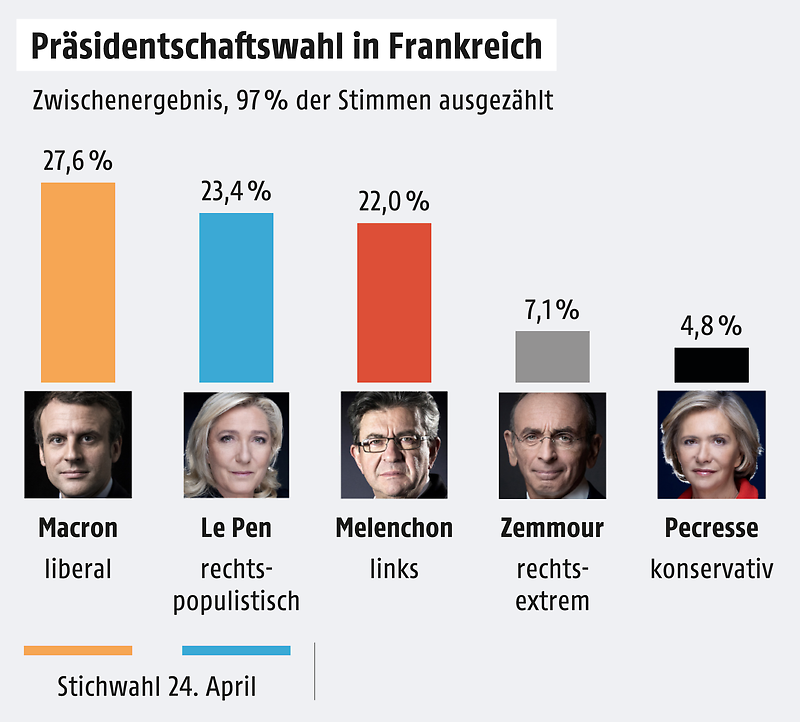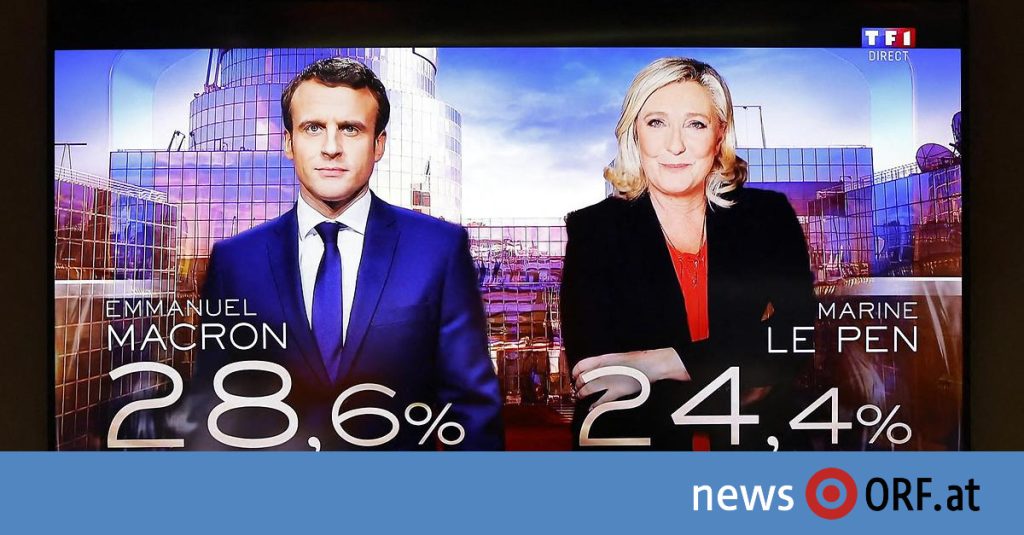With the exception of the left-wing foreign politician Jean-Luc Mélenchon, none of the candidates even came close to the run-off – on the contrary, the first ballot ended in the defeat of the conservatives and socialists, the former president of the country. ruling parties.
“Nothing will be the same,” Macron said, perhaps also from the perspective of France’s party scene on election night. Instead, he now wants to found a new political movement that everyone can join. As a reminder, Macron turned France’s party scene upside down when he first moved to the Elysee Palace in 2017 with the “movement” he founded En Marche, which later became La Republique en Marche (LREM).
Runoff between Macron and Le Pen
French President Macron takes first place after the elections, ahead of far-right candidate Le Pen. As was the case five years ago, there will be a run-off between the two.
“Not an option”
As in 2017, the duel was again between Macron against Le Pen, and “Le Figaro” wrote: “The surprise is that there are no surprises.” However, pollsters organizers expect a tighter race this time around. Five years ago, 66 percent voted for Macron in the second ballot, but on the evening of the election, the Ipsos-Sopra Steria Institute predicted a result of 54 to 46 percent. Ifop-Fiducial expected a very small lead for Macron, at 51 to 49 percent.
On her third attempt, Le Pen appears closer than ever to the highest office in the country. “What is at stake on April 24 is not the choice of circumstances, but the choice of society, the choice of civilization,” Le Pen said Sunday night. There were two opposing visions of the future.
Zemmour’s far-right campaign in favor of Le Pen
Despite the apparent lead over Le Pen, Macron noted the strong performance of right-wing parties: “When the far right in all its forms has significant support in the country, one cannot say that things are going well.” It seems that it was during those days also when the ranks of the left and the bourgeois camp closed in a defensive reaction against the right and formed a kind of republican front.
From the far right, and specifically from the far-right political path-changer Eric Zemmour, who won about seven percent of the vote with the Recovery Movement on the first ballot, it is not surprising that there is a clear recommendation for Le Pen.
No recommendation from Macron from Melenchon
Melenchon, who had just been defeated in the first round of the presidential election, urged his voters not to give Le Pen a single vote – the last hope of the left, which was able to trigger a surprise coup with the approval of 22 percent, saving the electoral recommendations of Macron Valérie Pecres (Republican) and Anne Hidalgo (Party). Democratic Socialist) as well as for Green Party and Communist candidates.

Should Le Pen come to power, there would be “serious consequences for the country and future generations,” warned Pecres, who received 4.8 percent of the vote, and is also looking for a historically negative record for her party. The same applies to Paris Mayor Hildago, with only 1.7 per cent. This raises the question of the value of these electoral recommendations: “Among politicians, the Republican Front is ahead. But it remains to be seen whether voters will follow suit,” said pollster Matthew Gallard of Ipsos.
The sword of Damocles Iqbal
For Le Parisien, there is no doubt that the outcome of the run-off “will depend mainly on the behavior of pro-Melenchon voters”. Unlike Zemmour voters, 85 percent of whom now want to vote for Le Pen, according to an Ipsos-Supra Styria poll published by the newspaper, Melenchon voters are “much more divided”. According to the poll, 34 percent said they want to vote for Macron, 30 percent support Le Pen, and 36 percent are still undecided or want to stay away from the run-off.
Voter turnout remains a big question mark: many left-wing voters have already stated in opinion polls that, unlike in 2017, they will not vote for Macron in the run-off just to prevent right-wing populist Le Pen from moving to the Elysee Palace. Macron now has to persuade those eligible voters to change their minds and vote for him in the second round on April 24.

“Food practitioner. Bacon guru. Infuriatingly humble zombie enthusiast. Total student.”








More Stories
Kyiv: Russian Kursk offensive halted
US Presidential Election: Former US Government Officials Warn Against Donald Trump's Election
Netherlands wants to leave asylum system